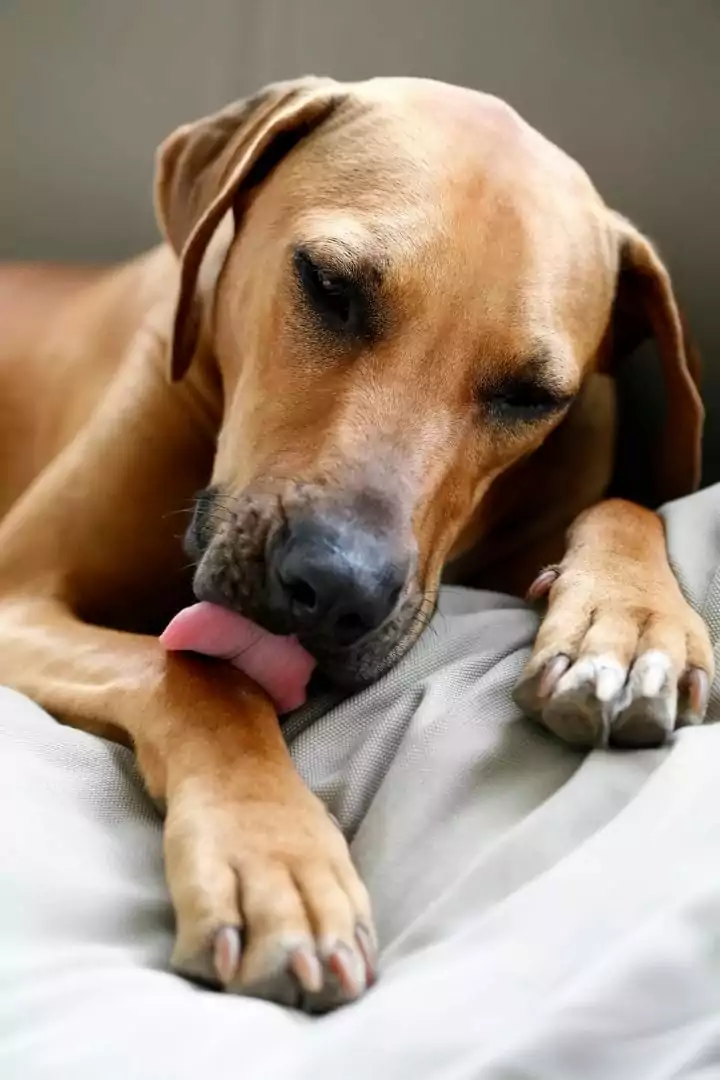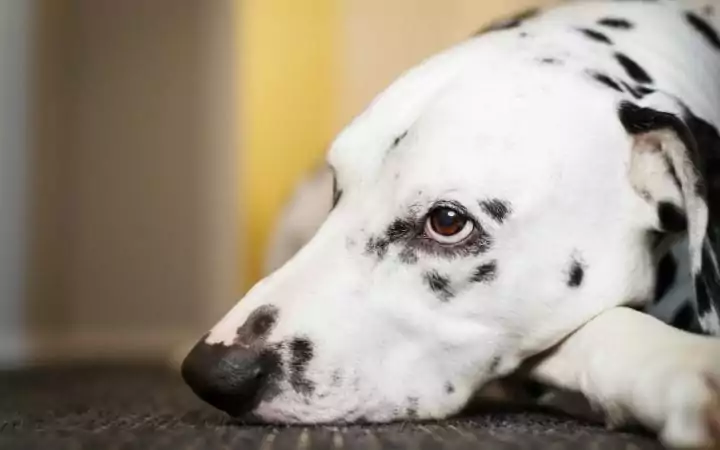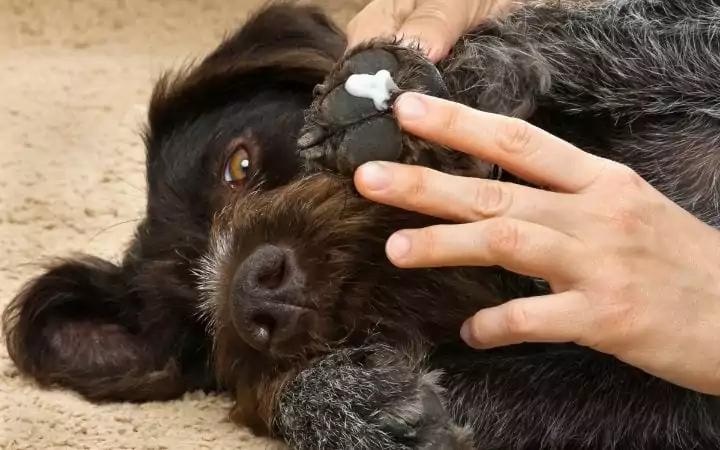What is a Lick Granuloma?
It’s the middle of the night and you wake up from your dog or cat licking. Licking themselves excessively. So you start wondering… Does my pet have fleas? Are they allergic to my detergent? Did they get hurt? All of the above are valid questions.
Your pet could have started licking for any of the above reasons, but the continuous form of licking is due to an obsessive disorder. Eventually, the excessive licking forms what is known as a lick granuloma. A lick granuloma also known as acral lick dermatitis; this is a skin disorder that results from your pet’s urge to lick one of their extremities. Sometimes your pet can have more than one lick granuloma making the condition that much more intense.
What are the causes of a dog licking excessively?
There are a few reasons why your pet may start licking. Some of them are:
- Joint disease – dogs and cats may lick to soothe their pain and if they have underlining joint disease they may lick the area to receive some comfort.
- Neoplasia – similar to joint disease any inflammation caused by cancer can cause pain and thus self-soothing from your pet.
- Injury – if there is an injury present your pet may lick to clean and help heal the wound.
- Allergies – allergies can cause your pet to become itchy, thus resulting in them biting, licking, and chewing the affected area.
- Skin infection – skin infection from fungus, bacteria, or yeast can cause irritation, inflammation, itchiness, and pain bringing your pet’s attention to the area.
- Foreign body – a foreign body in the area such as a splinter, glass, blade of grass can cause irritation and draw attention to the affected area.
- Ectoparasites – parasites such as mites or fleas can cause dermatitis.
- Boredom – your pet may simply lick their leg for stimulation.
- Endocrine disorders – endocrine disorders such as hypothyroidism or Cushing’s disease can result in lick granulomas.
- Stress – your pet may self mutilate to relieve stress.
- OCD/ behavioral psychological issue.
When a dog or cat licks, endorphins release causing temporary pain relief. Have you ever had a mosquito bite (if you haven’t let me know so we can move to wherever you are) and you know you’re not supposed to scratch it, but you do anyway? This is a similar scenario with your pet, except they aren’t aware they shouldn’t lick. So they lick to give themselves relief and to release endorphins. This only leads to more licking, and more licking, and more licking.
Psychological causes of Lick Granuloma
It’s important to determine the underlying cause of the lick granuloma in order to properly treat it. If it’s physical then the wound will have to be treated along with the reason causing it. Psychological causes make it much more tricky. It’s important to note that some lick granulomas do start with a physical issue but then continue due to psychological causes. Canine Obsessive Compulsive Order (OCD), stress, boredom, and separation anxiety all fall under this category. All of these disorders come from a mental ailment that causes the dog to self mutilate, in order to self-soothe.
How can Lick Granulomas be prevented?
Depending on what caused the lick granuloma in the first place will help in the prevention of it. Ectoparasites can be prevented by using a monthly topical/wearable/chewable preventive. Trauma, injury, or joint disease will best be prevented by keeping your dog on joint supplements and making sure any injury is properly treated by your veterinarian.
Keeping your pet in a safe environment can avoid them from getting foreign bodies. You should also check their bodies if they have a history of getting them. Endocrine disorders should be treated and regulated as best as possible by your veterinarian. As far as psychological disorders go there are a number of treatments available. Stress, separation anxiety and OCD can all be successfully treated with owner compliance and medication prescribed by your veterinarian. If boredom is the cause then give your pet outlets to stimulate them.
Diagnosing Lick Granuloma
Lick granulomas are diagnosed through a series of tests to find out what is causing it. Thorough patient history is crucial to the diagnostic process. Also, the location of the lick granuloma can help tip your veterinarian off to what is causing it. A skin scrape, tape test, smear impression, and fungal culture can all be performed to rule out any ectoparasite or skin infection. Skin biopsies, radiology, and fine needle aspirates can also be done to diagnose any present lesions or neoplasia.
Treatment and clinical management of Lick Granuloma
Treatment is all contingent on the reason behind the lick granuloma. Cold laser therapy has been effective in treating the inflamed area. Antibiotics and wound care are also standard of care. Wound care ranges from holistic medication to western medicine.
Some holistic options include manuka honey, silver spray, aloe, and chamomile tea poultice. We are not encouraging that holistic medication should be your only form of treatment but, we do think there is room for both choices. Some systemic medications can also help with the treatment of lick granulomas such as anti-inflammatories.
Topical ointments can help aid in the healing of the lick granuloma as well as create a physical barrier. Sometimes ointments are applied that will help deter your pet from the continuous licking. Behavior modifications can also be given to allow your pet the opportunity to stop licking. These include medications, training therapy, getting a companion animal, or seeking out a behavior specialist. If neoplasia or a tumor is present then surgical removal may be required.
Summary
Lick Granulomas can be extremely frustrating and challenging to control. However, it’s important to remember that they aren’t uncontrollable. With your veterinarian’s help, a solution can be obtained. It is essential though that you stay on board and are willing to dig deeper to find out the root cause.
This will help provide proper treatment and hopefully prevent lick granulomas from reoccurring. Most lick granulomas are attributed to psychological disorders. That being said it is important to keep your pets stimulated and to regularly interact with them to help them receive the attention they are seeking. The trick is to try and avoid lick granulomas from becoming a chronic issue for your pet. This can only be done with early intervention and strict owner compliance.




